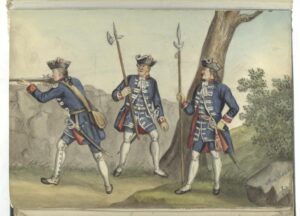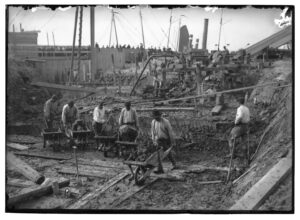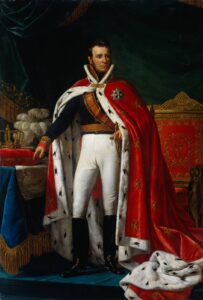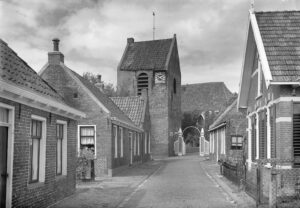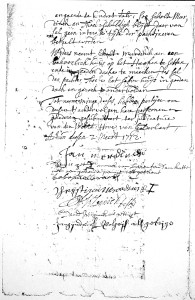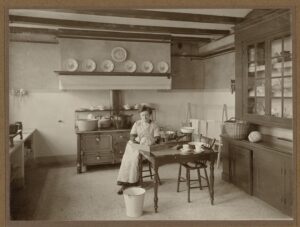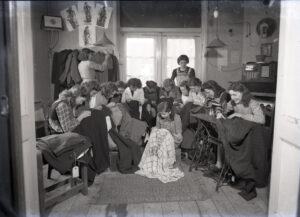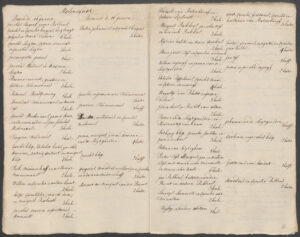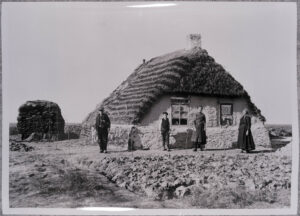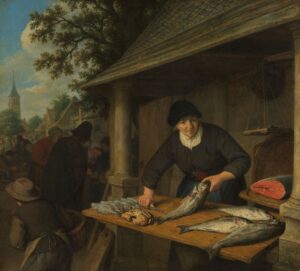I often get questions about finding military ancestors, and thought I would write a few posts about that. I will start with the early period, before 1795. Before 1795, most soldiers were professional soldiers, not conscripts. The Dutch Republic (1588-1795) hired both Dutch and foreign men. Often, whole regiments were hired, including from Scotland, Switzerland, and Germany. The regiments would be stationed in garrison towns throughout the republic, changing every few years. Some soldiers … [Read more...]
Dutch term – Grondwerker
A grondwerker (literally: ground worker) was a digger. Diggers could be employed by builders, to dig foundation trenches, or by canal builders. It was hard, low-paying work. … [Read more...]
Dutch term – Koninkrijk
Koninkrijk means kingdom. The Netherlands was the Dutch Republic until 1795, when the French occupied the country. It became the Kingdom of Holland in 1806, with Louis Napoleon as its first king. It was part of the French empire from 1810 to 1813. After the defeat of the French, it became the Kingdom of the Netherlands in 1813. The House of Orange has supplied the monarchs ever since. Kings of Holland Louis Napoleon (1806-1810) Kings and Queens of the Netherlands Willem I … [Read more...]
Dutch Term – Nederlands Hervormd
Nederlands Hervormd means Dutch Reformed, a protestant religion. You may come across the term in population registers or church records. The Dutch Reformed church adopted that name in 1816. Before that, it was known as Nederduits Gereformeerd [Nederdutch Reformed]. There are many other protestant religions that split off from the main Dutch Reformed church, including Gereformeerd [Christian Reformed]. … [Read more...]
Dutch term – Huur
Huur is a noun meaning rent. The verb huren means to rent, and verhuren means to let out (huren is from the viewpoint of the renter, verhuren from the viewpoint of the owner). Many people rented houses and/or land. Historically, most people in the Netherlands were too poor to own their own houses, and rented them instead. The owners were often richer people in the town, noble families, churches, or (especially in earlier periods), monasteries and convents. Some rental contracts were made … [Read more...]
Dutch term – Keuken
The keuken is the kitchen. You may come across the term in estate inventories, where the items in the house are tallied by room. Kitchens originally had open fires, then hearths, and in the 19th and 20th century this gradually changed to stoves. Small houses where poor people lived did not typically have a separate kitchen. They would cook over the hearth fire or furnace in the living room. … [Read more...]
Dutch term – Naaien, naaister
Naaien means to sew. A naaister is a seamstress. In the past, professional naaisters were typically poor women, though women of all classes were taught the basics. Naaien could be done from home, and was an employment possible for women with young children. It is one of the few occupations open to women with children out of wedlock, who would rarely be welcome to work as servants in "respectable" households or stores. … [Read more...]
Source – Mill tax records
Before say 1800, taxes varied widely depending on the location. Several provinces instituted a mill tax; a tax on grinding grain. The tax could be levied in different ways. Often, a fixed sum was charged per head, with a reduced rate for children under 16. In some jurisdictions, the tax collector collected the taxes and recorded who paid what. In other jurisdictions, the tax was leased to the highest bidder, who would then collect the taxes and got to keep any profits above the paid sum. In … [Read more...]
Dutch term – Plaggenhut
A plaggenhut is a sod cabin; a house built using layers of topsoil. These houses were used by poor people, especially in the peaty areas in the north-east of the Netherlands where there was no natural stone or clay. … [Read more...]
Dutch term – Visvrouw
A visvrouw [literally: fish woman] is a female fish seller. It was not uncommon for wives of fishermen to sell the fish at markets. … [Read more...]
